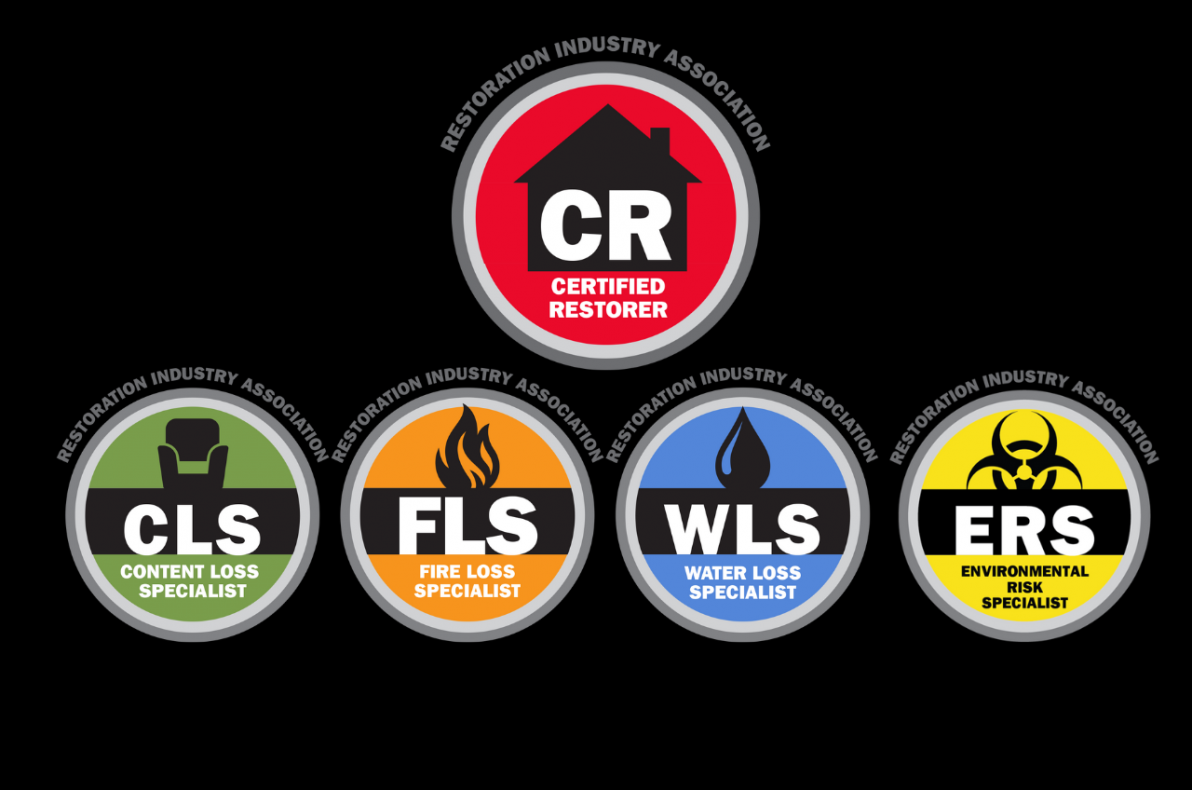5 reasons to become certified in the RIA’s advanced pillar designations

Considered the premiere designations within the restoration industry, the Restoration Industry Association (RIA) offers advanced pillar designations to help restoration professionals stand apart as experts in specific areas of loss.
The advanced pillar designation program includes four designations, culminating in the RIA’s capstone Certified Restorer (CR) designation, the penultimate achievement in comprehensive restoration.
The four pillar designations include:
- Fire Loss Specialist (FLS)
- Water Loss Specialist (WLS)
- Content Loss Specialist (CLS)
- Environmental Risk Specialist (ERS)
Restoration professionals must achieve each of the four pillars before pursuing their Certified Restorer (CR) designation.
In a recent focus group, restoration professionals from across the country who have completed the RIA advanced pillar designations discussed the benefits of pursuing certification. Here are the top five reasons:
#1 - Tap into the gold standard of industry knowledge
Those who attend the RIA’s advanced pillar designation courses are able to tap into the gold standard of industry knowledge by accessing the expertise of industry-leading instructors and fellow classmates who are knowledgeable professionals with years of experience working in the restoration industry. This allows participants to learn from the best in the industry, gain insights from different perspectives, and stay up-to-date on the latest techniques, tools, and trends in their area of specialization.
In addition, the smaller class sizes of in-person courses provide opportunities for thoughtful discussions. Participants can engage in meaningful dialogues, ask questions, and exchange ideas with their peers and instructors. This fosters a collaborative learning environment where participants can build relationships, network, and receive mentorship from experienced professionals.
#2 - Gain a strong networking of peers across the country
By earning an advanced pillar designation from the RIA, certificants become part of a specialized network of experienced restorers. This network is tremendously valuable when restorers find themselves in unique and challenging situations and provides the opportunity for problem-solving and expertise-sharing with certified peers. These networks and connections built with peers in the field can also lead to new business opportunities, collaborations, and mentorship relationships.
According to Josh Prebil, FLS, WLS, "I've built life-long expert connections that I am able to reach out to in order to problem-solve issues that come up in my business."
#3 - Keep up-to-date
The RIA's advanced pillar designations require ongoing education that keeps you up-to-date with industry best practices.
The designations are designed to ensure that professionals have in-depth knowledge about their area of specialization. By taking these courses, professionals can learn about industry standards, technologies, and advancements in their field, ensuring that they are always using the best practices in their work. This ongoing education is essential in a rapidly changing industry, allowing professionals to stay competitive and provide the highest level of service to their clients.
#4 - Demonstrate a commitment to quality
Achieving the advanced pillar designations demonstrates a commitment to quality because they are earned through a rigorous process that requires a deep understanding of specific areas of restoration. By achieving these designations, professionals demonstrate that they have a comprehensive knowledge of best practices, industry standards, and ethical considerations related to their area of specialization.
“As a business owner,” says Jay Van Deusen, CLS, FLS, WRT, ASD, FSRT, AMRT, CPT, “it becomes risk mitigation when employees are certified and have the same level of knowledge.”
With a team of certified professionals, businesses can provide consistent, high-quality services that meet or exceed industry standards. This, in turn, can help to build a positive reputation for the business and lead to increased customer satisfaction, referrals, and repeat business.
Moreover, employee certification through advanced pillar designations can help to mitigate risk in businesses by ensuring compliance with standards requirements and minimizing the likelihood of errors, omissions, or other issues that can result in costly mistakes or legal disputes. With certified professionals on staff, businesses can demonstrate that they take quality seriously and are committed to providing exceptional service to their clients. This can provide a competitive advantage in the marketplace and help to position the business as a leader in the industry.
#5 - Build confidence in your profession and with clients
Earning an advanced pillar designation from the RIA can help you stand out as a leader in restoration and showcase your expertise to clients, insurers, and other stakeholders. This recognition can enhance your reputation and increase your business opportunities.
“I came into this industry, which was a family business, after being in another industry for many years,” says Tammy Stokes, CLS, ERS,FLS, WLS. “The advanced pillar designation courses helped me become more confident in my work and my career choice.”
Achieving advanced designations from a reputable organization like the RIA can elevate your credibility and help you establish yourself as a highly skilled and sought-after professional in the restoration industry.
If you are interested in taking your professional development to the next level, visit restorationindustry.org/certifications to get started.
